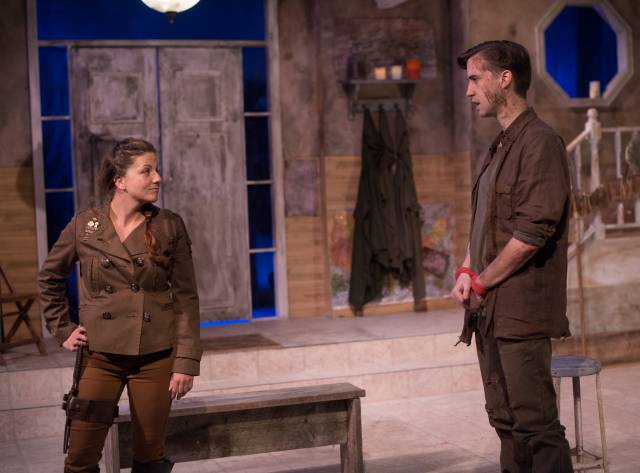

One can imagine Mac Rogers sitting at home one day, looking around at the room where he was and wondering what would become of it when he was no longer around. Would it be still standing one hundred years from now? Would its next inhabitants use it for the same purpose he did? Would it be harboring humans even? Wherever his imagination took him, must have been what drove him to write The Honeycomb Trilogy, a truly epic work of science fiction that takes place in a single room and spans two decades, includes one alien invasion, and features one of the most harrowing accounts of sibling rivalries since Biblical times.
If Mr. Rogers’ source of inspiration was indeed a different one, it’s testament to the quality of the plays, that they allow audience members to travel with it, they’re the kind of plays that invite people to think and wonder, rather than just concentrating on “telling a story”, they’re the kind of plays that understand that great theatre works as a mirror that will reflect back something different to each of the people sitting in the dark, each of them an “alien” being welcomed into the world of the plays. Because Mr. Rogers writes science fiction, it happens to be that this particular world has been invaded by cockroach-like aliens who arrived to Earth invited by an idealistic astronaut Bill (Sean Williams) who made their arrangements for their arrival in the first play, Advance Man.
Rogers treats this first installment like a domestic drama which sees Bill’s obsession with his work tear his family apart. His wife Amelia (an exemplary Kristen Vaughan) believes he is cheating on her, his son Abbie (David Rosenblatt) is dealing with high school bullies, his daughter Ronnie (Becky Byers) is rebelling by staying out beyond her curfew and flirting with her parents’ friends, and Bill has decided to become caretaker to his colleague Conor (Jason Howard) who had a stroke on their last mission. In Blast Radius, the second chapter, set 12 years after Advance Man, Bill is long gone and Ronnie and Abbie have become enemies. He embraces the plans the aliens of the honeycomb have for the human race, while she wants to exterminate them and reclaim her planet.
While science fiction has been used across the decades to serve as a reflection of society’s fears and hopes - and have no doubt that The Honeycomb Trilogy addresses sociopolitical issues such as eco-terrorism, migration reform, education and same sex unions in smarter ways than anything else produced over the last decade - Rogers never loses the main focus of the trilogy which is the Steinbeck-ian quality of the siblings’ tug-of-war. By the time we arrive to the last chapter called Sovereign, Abbie and Ronnie are played by different actors, Stephen Heskett and a formidable Hanna Cheek respectively, but their soul remains unchanged; whether they like it or not, and even if they’ve fought over different political beliefs, they realize they are still the same children who used to fight over nothings during dinner time.
The Honeycomb Trilogy is an admirable achievement in terms of production (the imaginative set design and the impressive work of the ensemble deserve articles of their own) but it’s the brilliance of the writing that strikes the most, because of Rogers’ ability to manipulate genre to his convenience. Rather than using genre elements for exploitation, he creates a hybrid that has us moved by courtroom scenes, sees us tense during domestic arguments and has us laughing over the nonsensical nature of war. Rogers is a master at using elements of drama to create worlds that thrive, but never depend, on references. From the gender bending names of the siblings, to their undoubtedly Oedipal fixation on dating people who remind them of their absent father, not to mention the introduction of a “Chekhov punch” (the payoff is perfection!), Rogers has created a work that’s alive in more than one way. A testament to permanence that reminds us that our world isn’t bound by the rooms we inhabit, but by the walls within our minds.